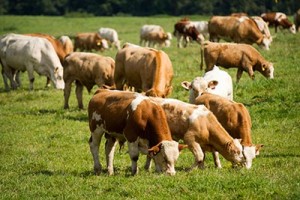Eating Organic
 In addition to having definite benefits to your health and the environment, organic meat typically has an authentic flavour that is much appreciated by meat connoisseurs. In fact, many renowned chefs use organic products because of their particular taste.
In addition to having definite benefits to your health and the environment, organic meat typically has an authentic flavour that is much appreciated by meat connoisseurs. In fact, many renowned chefs use organic products because of their particular taste.
 The difference with respect to taste is even more evident in meat, due to the conditions in which the livestock is being raised. Since the animals spend a considerable amount of time in the open air, receive a quality feed, and are slaughtered later in life, their flesh is denser and contains a lot less fat and water than regular meat.
The difference with respect to taste is even more evident in meat, due to the conditions in which the livestock is being raised. Since the animals spend a considerable amount of time in the open air, receive a quality feed, and are slaughtered later in life, their flesh is denser and contains a lot less fat and water than regular meat.
As we realize that the quality of food we consume plays a role in the proper functioning of body and mind, do we really want to be voluntarily ingesting toxic products ? A recent U.S. study (source : PANNA Email News Service) involving children aged from 2 to 4 years (the age group most at risk considering the ratio of food ingested in proportion to body mass) revealed that children being fed organic food have six times lower concentrations of pesticide residue than children consuming regular products…. definitely food for thought !
 We’ve all heard of antibiotic resistant bacteria; to reduce their spread in meat and the environment, Europe has prohibited the use of antibiotics for stimulating livestock growth. An American judge is leading a crusade to force our neighbors from the south to do the same. Here in Canada, it is still allowed! You may be surprised to know that 80% of antibiotics used in this country are administered to animals (source: Public Health Agency of Canada). By including food free of pesticides, antibiotics, and artificial growth hormones into your diet, you are sparing your body of unhealthy chemical substances. By choosing organic meat, you reduce your risk of developing cancer and other diseases !
We’ve all heard of antibiotic resistant bacteria; to reduce their spread in meat and the environment, Europe has prohibited the use of antibiotics for stimulating livestock growth. An American judge is leading a crusade to force our neighbors from the south to do the same. Here in Canada, it is still allowed! You may be surprised to know that 80% of antibiotics used in this country are administered to animals (source: Public Health Agency of Canada). By including food free of pesticides, antibiotics, and artificial growth hormones into your diet, you are sparing your body of unhealthy chemical substances. By choosing organic meat, you reduce your risk of developing cancer and other diseases !
 Are you familiar with genetically modified organisms (GMO’s)? ? Many conventional foods (non organic) contain GMO’s. The main genetically-modified crops are (in order of significance) soy, cotton, corn, and canola/rapeseed. More than 80% of GMO’s are intended for livestock feed. As such, bovine, pork, and poultry destined for food production are fed transgenic corn or soy. Did you know that 80% of all conventional soy globally produced is genetically modified ? Unfortunately, a GMO labelling is not yet mandatory in Canada.
Are you familiar with genetically modified organisms (GMO’s)? ? Many conventional foods (non organic) contain GMO’s. The main genetically-modified crops are (in order of significance) soy, cotton, corn, and canola/rapeseed. More than 80% of GMO’s are intended for livestock feed. As such, bovine, pork, and poultry destined for food production are fed transgenic corn or soy. Did you know that 80% of all conventional soy globally produced is genetically modified ? Unfortunately, a GMO labelling is not yet mandatory in Canada.
If it was, consumers would realize how extensive the use of GMO’s is and would surely have a negative impact on the agri-food industry.
Most people choose to eat organic primarily for health reasons and to help protect the environment. Organic producers apply environmentally-conscious practices, which allow them to offer healthy food choices to the consumer. Rather than use chemical fertilizer, they use compost with a base of organic material to enrich the soil. By the same token, in place of herbicides, they prefer to control unwanted weed growth by rotating their suitable crops and by mechanical weeding.
 For their part, food processors ensure that no artificial preservatives or colouring are used in the preparation of organic food.All these factors are to help ensure that the organic food you are consuming is produced in a healthy environment.
For their part, food processors ensure that no artificial preservatives or colouring are used in the preparation of organic food.All these factors are to help ensure that the organic food you are consuming is produced in a healthy environment.
Eating organically means consuming healthy food that has been certified by a reliable organic regulation system.
 If you are among those who care about the welfare of animals, you will be glad to know that organic producers share this concern with you. The organic sector has been at the forefront of animal welfare for some time now, adopting measures reflecting this conviction.Besides being fed 100% organic forage and grains, animals destined for the organic market are treated with respect. It is mandatory that they be allowed outdoors and, when indoors, to enjoy a more spacious area ; two advantages which contribute to their well-being. With regard to transporting the animals, it is regulated by strict standards that ensure transporting is done under the best possible conditions.
If you are among those who care about the welfare of animals, you will be glad to know that organic producers share this concern with you. The organic sector has been at the forefront of animal welfare for some time now, adopting measures reflecting this conviction.Besides being fed 100% organic forage and grains, animals destined for the organic market are treated with respect. It is mandatory that they be allowed outdoors and, when indoors, to enjoy a more spacious area ; two advantages which contribute to their well-being. With regard to transporting the animals, it is regulated by strict standards that ensure transporting is done under the best possible conditions.
 Furthermore, if an animal destined for slaughter raised in conformity with organic standards gets sick and requires antibiotics, the producer will not let it suffer unnecessarily. Once properly treated, the animal is simply downgraded, since it can no longer be certified as organic. In the case of dairy cows treated with antibiotics, a period of one year must pass before its milk can again qualify for organic certification. Organic producers are known to have a high ethical standard in the raising of livestock.
Furthermore, if an animal destined for slaughter raised in conformity with organic standards gets sick and requires antibiotics, the producer will not let it suffer unnecessarily. Once properly treated, the animal is simply downgraded, since it can no longer be certified as organic. In the case of dairy cows treated with antibiotics, a period of one year must pass before its milk can again qualify for organic certification. Organic producers are known to have a high ethical standard in the raising of livestock.
